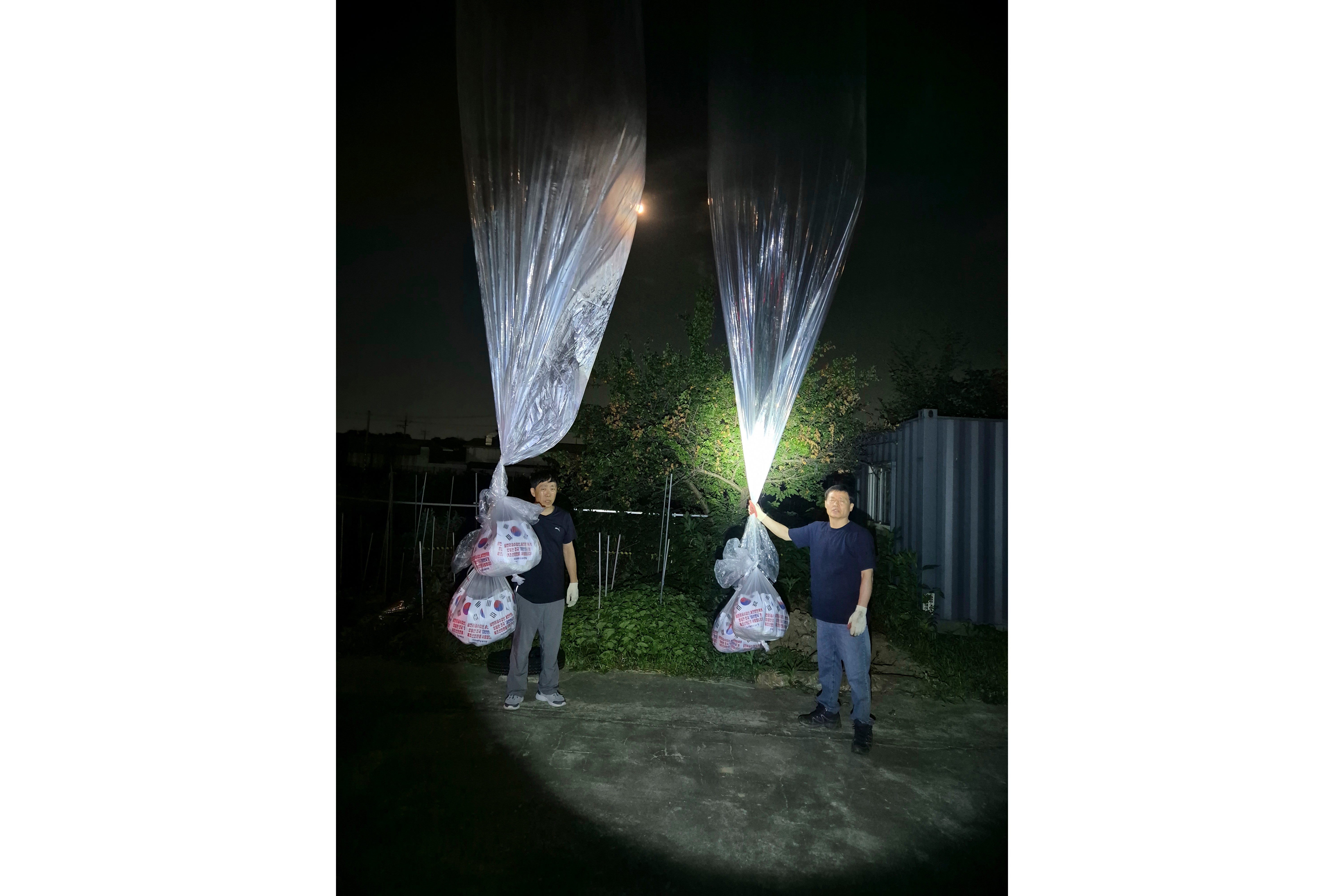Change in wind direction prompts worry about more North Korean trash balloon launches toward South
South Korea is monitoring an expected change in the wind direction on Monday that could allow North Korea to send more trash-carrying balloons across their heavily armed border, in their latest bout of tit-for-tat psychological warfare

Your support helps us to tell the story
From reproductive rights to climate change to Big Tech, The Independent is on the ground when the story is developing. Whether it's investigating the financials of Elon Musk's pro-Trump PAC or producing our latest documentary, 'The A Word', which shines a light on the American women fighting for reproductive rights, we know how important it is to parse out the facts from the messaging.
At such a critical moment in US history, we need reporters on the ground. Your donation allows us to keep sending journalists to speak to both sides of the story.
The Independent is trusted by Americans across the entire political spectrum. And unlike many other quality news outlets, we choose not to lock Americans out of our reporting and analysis with paywalls. We believe quality journalism should be available to everyone, paid for by those who can afford it.
Your support makes all the difference.South Korea is monitoring an expected change in the wind direction on Monday that could allow North Korea to send more trash-carrying balloons across their heavily armed border, in their latest bout of tit-for-tat psychological warfare.
Last week, North Korean leader Kim Jong Un and Russian President Vladimir Putin signed a major defense deal that observers worry could embolden Kim to direct more provocations at South Korea.
That could include the launching of more huge balloons carrying rubbish toward South Korea in response to a South Korean civilian group's recent floating of balloons with anti-North Korean propaganda into the North.
South Korean Joint Chiefs of Staff spokesperson Lee Sung Joon told reporters Monday that the military is closely monitoring North Korean moves because northerly or northwesterly winds, favorable for North Korean balloon launches, were forecast on Monday.
Starting in late May, North Korea launched a series of balloons that dropped manure, cigarette butts, scraps of cloth, waste batteries and vinyl in various parts of South Korea. No highly dangerous materials were found. North Korea said its balloon campaign was a tit-for-tat action against South Korean activists who flew political leaflets critical of its leadership across the border.
Kim's influential sister, Kim Yo Jong, threatened Friday to retaliate after a South Korean group said it sent 20 balloons carrying 300,000 propaganda leaflets, 5,000 USB sticks with South Korean pop songs and TV dramas, and U.S. one-dollar bills across the border the previous night.
“When you do something you were clearly warned not to do, it’s only natural that you will find yourself dealing with something you didn’t have to,” Kim Yo Jong said, without saying whether North Korea would launch balloons again.
The South Korean military didn't say how it would respond if North Korea conducts a new round of balloon launches.
In reaction to North Korea's earlier balloon campaign, South Korea's military on June 9 redeployed gigantic loudspeakers along the border for the first time in six years and resumed anti-North Korean propaganda broadcasts. The broadcasts reportedly included hits by K-pop sensation BTS such as “Butter” and “Dynamite,” weather forecasts and news on Samsung, the biggest South Korean company, as well as criticism of North Korea’s missile program and its crackdown on foreign videos.
North Korea views front-line South Korean broadcasts and civilian leafleting campaigns as a grave provocation because it bans access to foreign news for most of its 26 million people. North Korea has reacted to past South Korean loudspeaker broadcasts and civilian balloon activities by firing rounds across the border, prompting South Korea to return fire, according to South Korea. No casualties were reported.
Earlier Monday, South Korea, the United States and Japan issued a joint statement strongly condemning expanding military cooperation between Russia and North Korea. It said the North Korean-Russian moves should be of “grave concern” to efforts to promote peace on the Korean Peninsula, the global non-proliferation regime and support for the Ukraine people.
During a meeting in Pyongyang, North Korea's capital, last Wednesday, Kim Jong Un and Putin struck a deal requiring each country to provide aid if attacked and vowed to boost other cooperation. Observers say the accord represents the strongest connection between the two countries since the end of the Cold War. The U.S. and its partners believe North Korea has already been providing Russia with much-needed conventional arms for its war in Ukraine in return for military and economic assistance.
The South Korea-U.S.-Japan statement said the three countries reaffirmed their intention to further boost diplomatic and security cooperation to cope with North Korean threats and prevent an escalation of the situation. It said U.S. commitments to the defense of South Korea and Japan “remain ironclad.”
Last Saturday, a nuclear-powered U.S. aircraft carrier arrived in South Korea for a three-way Seoul-Washington-Tokyo military exercise that is expected to begin this month.
North Korea has previously called such joint U.S. military drills an invasion rehearsal and responded with missile tests. North Korea maintains that U.S. hostility forced it to pursue nuclear weapons in self-defense.